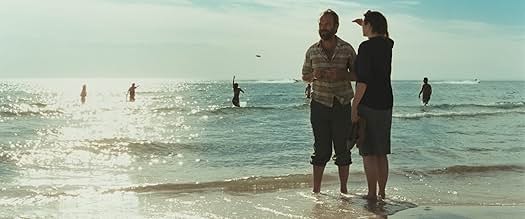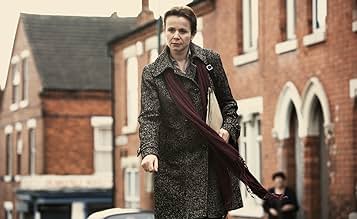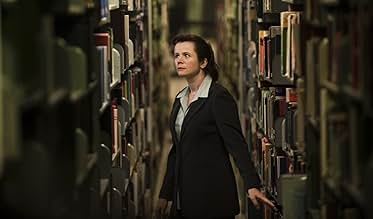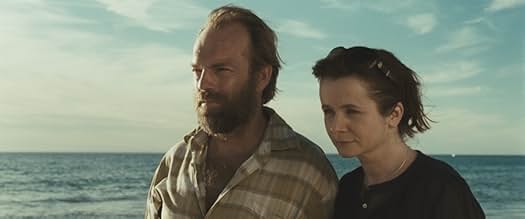IMDb-BEWERTUNG
7,1/10
6091
IHRE BEWERTUNG
Füge eine Handlung in deiner Sprache hinzuSet in 1980s Nottingham, social worker Margaret Humphreys holds the British government accountable for child migration schemes and reunites the children involved -- now adults living mostly ... Alles lesenSet in 1980s Nottingham, social worker Margaret Humphreys holds the British government accountable for child migration schemes and reunites the children involved -- now adults living mostly in Australia -- with their parents in Britain.Set in 1980s Nottingham, social worker Margaret Humphreys holds the British government accountable for child migration schemes and reunites the children involved -- now adults living mostly in Australia -- with their parents in Britain.
- Regie
- Drehbuch
- Hauptbesetzung
- Auszeichnungen
- 10 Gewinne & 21 Nominierungen insgesamt
Heath Tammy
- Susan
- (as Tammy Wakefield)
Alastair G. Cumming
- Australia House Official
- (as Alistair Cummings)
Empfohlene Bewertungen
Oranges and Sunshine – CATCH IT (B+) The film tells the story of Margaret Humphreys, a social worker from Nottingham who uncovered the scandal of "home children", a scheme of forcibly relocating poor children from the UK to Australia and Canada. Margaret reunites estranged families and brings worldwide attention to the cause. Deported children were promised oranges and sunshine but they got hard labor and life of misery and sexual abuse in institutions such as Keaney College in Bindoon, Western Australia. (Wiki) Oranges and Sunshine is a sensitive subject matter which defiantly put Britain in Shame when Margaret Humphreys broke out the story in 80s. Emily Watson's portrayal of Margaret Humphreys' trouble to help the transported kids all the way to Australia is heart wrenching. The emotional turmoil she goes to work for them while managing her family is something really inspiring. Emily Watson is a great actress and no doubt she brings her emotional range to the real life role model. In supporting cast Hugo Weaving & David Wenhem did a fine job. Overall, it's a sensitive movie about a sensitive issue. Keep in mind its tear jerker, so keep a box of tissue.
Sarah's Key was critically lauded for its reliable method of evoking raw anguish in its audience by depicting the trauma of a savage injustice from a child's perspective. In the same year, Jim Loach's feature drama handles the similar material of an scandal that's just about on par with the Vel d'Hiv roundup, but the film's subjects are all well into adulthood by the time we are meeting them. The fact that the victims are always shown as adults (in physical form at least) has given the achievement of pulling off this excellent film a higher degree of difficulty, seeing as the actors and screenplay writers are required to work extra hard to win the audience's sympathy, rather than having the simple forgivable innocence of an actual child on screen doing the job. However, this is not to say that Sarah's Key was mere emotional pornography: it found excellent ways of challenging itself in other aspects which gave it a greater level of sophistication, but in terms of expressing the heartbreak, the feat of Oranges and Sunshine is much more remarkable.
Among the topics being explored here is the very complicated issue of adoption. The burdensome puzzle of how a child in an unstable family situation or an unhealthy state of living should receive professional help – whether such interference is truly protecting their best interests or inflicting deep psychological harm by depriving them of family – has long been troubling child protection authorities. In mid- twentieth-century England, the popular solution settled on was the organised deportation of these children to Australia. Told that they were orphans, with no living relatives to care for them, they would be sent over in large numbers and, once there, sold into slavery for a respected church organisation commonly refferrred to as "The Brothers".
Several decades later, a determined social worker from Nottingham has begun to single-handedly reunite the victims of the outrage with their family back in England. As they relate to her their heartwrenching stories, each with their own despicable atrocities on top of what has already been mentioned, the irreparable damage of being raised without a proper family becomes apparent, and they are reduced to miserable, vulnerable, homesick little children. Its frequent mentioning of mothers, its claim that the wound of lost parents will never truly heal, and the fact that most of the victims shown are boys creates very distinct allusions to Peter Pan, even before that similarity is actually mentioned by one of the people. An additional noticeable parallel between this film and another classic story is the idea of a child suffering lonesomely at the hands of a cruel organisation under the sneaky pretense that they are an orphan, which is reminiscent of Oliver Twist.
However, it would be grossly unfair to just cynically dissect this film using only comparisons: it displays a very impressive divergence from the typical conspiracy drama. Its most prominent asset is the fully- fledged characterisation of its activist hero and the equal attention spent on showing her suffering as well that of her clients. The delightful Emily Watson obviously does a great deal to bring her to life, playing her so brilliantly that she comes across as both perfectly likable and humanly multi-faceted. Hearing such painful stories is incredibly taxing, and the growing unpopularity she is gaining as she stirs the government and the press results in some truly terrifying personal attacks while she is staying in Australia, but as the authorities are refusing to assist her, she knows that she must not allows herself to withdraw from her mission as no one else will be willing to pick it up. She does, of course, also become estranged from her family as the task begins to consume her, but thankfully not instantly, allowing the satisfying realism to remain intact.
Also a relief is that a handful of the people she is helping are actually showing genuine gratitude and returning the favour by giving her personal assistance. The friendships she forms with these people are truly touching, and effectively lighten the situation for both the hero (Margaret) and the audience.
With a very capable supporting cast, featuring David Wenham, Hugo Weaving and Tara Morice (Strictly Ballroom), in the roles of the victims and Margaret's family, this is a highly commendable and worthwhile piece of filmmaking, let down only by the rather repetitive nature of the script, if anything.
Among the topics being explored here is the very complicated issue of adoption. The burdensome puzzle of how a child in an unstable family situation or an unhealthy state of living should receive professional help – whether such interference is truly protecting their best interests or inflicting deep psychological harm by depriving them of family – has long been troubling child protection authorities. In mid- twentieth-century England, the popular solution settled on was the organised deportation of these children to Australia. Told that they were orphans, with no living relatives to care for them, they would be sent over in large numbers and, once there, sold into slavery for a respected church organisation commonly refferrred to as "The Brothers".
Several decades later, a determined social worker from Nottingham has begun to single-handedly reunite the victims of the outrage with their family back in England. As they relate to her their heartwrenching stories, each with their own despicable atrocities on top of what has already been mentioned, the irreparable damage of being raised without a proper family becomes apparent, and they are reduced to miserable, vulnerable, homesick little children. Its frequent mentioning of mothers, its claim that the wound of lost parents will never truly heal, and the fact that most of the victims shown are boys creates very distinct allusions to Peter Pan, even before that similarity is actually mentioned by one of the people. An additional noticeable parallel between this film and another classic story is the idea of a child suffering lonesomely at the hands of a cruel organisation under the sneaky pretense that they are an orphan, which is reminiscent of Oliver Twist.
However, it would be grossly unfair to just cynically dissect this film using only comparisons: it displays a very impressive divergence from the typical conspiracy drama. Its most prominent asset is the fully- fledged characterisation of its activist hero and the equal attention spent on showing her suffering as well that of her clients. The delightful Emily Watson obviously does a great deal to bring her to life, playing her so brilliantly that she comes across as both perfectly likable and humanly multi-faceted. Hearing such painful stories is incredibly taxing, and the growing unpopularity she is gaining as she stirs the government and the press results in some truly terrifying personal attacks while she is staying in Australia, but as the authorities are refusing to assist her, she knows that she must not allows herself to withdraw from her mission as no one else will be willing to pick it up. She does, of course, also become estranged from her family as the task begins to consume her, but thankfully not instantly, allowing the satisfying realism to remain intact.
Also a relief is that a handful of the people she is helping are actually showing genuine gratitude and returning the favour by giving her personal assistance. The friendships she forms with these people are truly touching, and effectively lighten the situation for both the hero (Margaret) and the audience.
With a very capable supporting cast, featuring David Wenham, Hugo Weaving and Tara Morice (Strictly Ballroom), in the roles of the victims and Margaret's family, this is a highly commendable and worthwhile piece of filmmaking, let down only by the rather repetitive nature of the script, if anything.
Carronas' review could not be more wrong! She could not even get the directors name right. It's JIM not LEN Loach, and the rest of the review is just as inaccurate. I had no trouble following the story line even without any prior knowledge of the events. I had no trouble understanding where each scene was set, be it UK or Oz, it was perfectly clear which was which. The film stock helped to give that dated feel of the 1980's and this was further enhanced by the vehicles, furniture and fashions. The lack of dialogue in certain scenes (meeting the Brothers) added tension where words would have added nothing. This was an excellent film, well filmed and well acted. See it and enjoy.
A quietly angry, lightly fictionalized film detailing the systematic, organized UK government sanctioned deportation of up to 150,000 children, often as young as three to Australia, South Africa, New Zealand and Zimbabwe.
In case you were under the assumption that this occurred in the dark ages, you would be wrong. The last cases are recorded in the late 1960's and early 1970's.
Emily Watson plays Margaret Humphreys the tireless Nottinghamshire social worker, who stumbled across an isolated case and then fought almost single-handedly to undercover the truth. Creating the "Child Migrants" trust by necessity to reunite lost families, sometimes decades later and in many cases too late.
The film is based on the the book "Empty Cradles" written by Humphreys to highlight the plight of the families and children involved and raise much needed funds.
Not only were children sent to countries alien to them, in the majority of cases without parental consent or even with the parents knowledge, many were told incorrectly their parents had died leaving them as orphans. Brothers and sisters were systematically split up and many endured harsh conditions, being treated as slave labour and subject to both mental and in many cases physical and sexual abuse, often at the hands of those supposedly charged with their care and well being.
As in many such cases, the Church and charitable organizations, when confronted with the proof of the neglect they oversaw, denied the charges and repeatedly attempted to frustrate attempts to drag the secret into the light.
Eventually in 2010 the UK Government formally apologised for the migrants treatment, finally acknowledging the mistakes that had been made.
Bearing in mind the shocking truths on display, does the film need to be any good? Directed by small screen veteran Jim Loach, this is a sympathetic account with quality naturalistic acting from all of the cast, in particular Watson and Hugo Weaving an adult sent as a child to Australia for "Sunshine and Oranges". Humphreys long suffering and supportive husband deserves a medal of some description as his wife continues to travel the world putting wrongs right or at least allowing closure, seemingly with little regard for her own safety, mental or physical health.
The film resembles "Magdalene Sisters", all the more effective for the lack of moralizing, preaching and sentimentality, apart from one off key line "You got my Mum for Christmas", the dialogue and acting are pitch perfect.
There are always concerns as to how fictionalized true stories are, certainly the facts are undeniable, all films compress time, alter circumstances and timelines. The most important factor is, does the film capture the spirit and feel, this does just that.
Summary
A stirring, largely truthful re-telling of an important story in our recent past, not an easy watch in parts but well worth the time to be aware of this travesty, compounded by the initial failure of anyone brave enough to take responsibility for what had occurred.
Watson embodies the spirit of Humphreys who quite rightly eventually received recognition for all her efforts.
Recommended
http://julesmoviereviews.blogspot.co.nz/
In case you were under the assumption that this occurred in the dark ages, you would be wrong. The last cases are recorded in the late 1960's and early 1970's.
Emily Watson plays Margaret Humphreys the tireless Nottinghamshire social worker, who stumbled across an isolated case and then fought almost single-handedly to undercover the truth. Creating the "Child Migrants" trust by necessity to reunite lost families, sometimes decades later and in many cases too late.
The film is based on the the book "Empty Cradles" written by Humphreys to highlight the plight of the families and children involved and raise much needed funds.
Not only were children sent to countries alien to them, in the majority of cases without parental consent or even with the parents knowledge, many were told incorrectly their parents had died leaving them as orphans. Brothers and sisters were systematically split up and many endured harsh conditions, being treated as slave labour and subject to both mental and in many cases physical and sexual abuse, often at the hands of those supposedly charged with their care and well being.
As in many such cases, the Church and charitable organizations, when confronted with the proof of the neglect they oversaw, denied the charges and repeatedly attempted to frustrate attempts to drag the secret into the light.
Eventually in 2010 the UK Government formally apologised for the migrants treatment, finally acknowledging the mistakes that had been made.
Bearing in mind the shocking truths on display, does the film need to be any good? Directed by small screen veteran Jim Loach, this is a sympathetic account with quality naturalistic acting from all of the cast, in particular Watson and Hugo Weaving an adult sent as a child to Australia for "Sunshine and Oranges". Humphreys long suffering and supportive husband deserves a medal of some description as his wife continues to travel the world putting wrongs right or at least allowing closure, seemingly with little regard for her own safety, mental or physical health.
The film resembles "Magdalene Sisters", all the more effective for the lack of moralizing, preaching and sentimentality, apart from one off key line "You got my Mum for Christmas", the dialogue and acting are pitch perfect.
There are always concerns as to how fictionalized true stories are, certainly the facts are undeniable, all films compress time, alter circumstances and timelines. The most important factor is, does the film capture the spirit and feel, this does just that.
Summary
A stirring, largely truthful re-telling of an important story in our recent past, not an easy watch in parts but well worth the time to be aware of this travesty, compounded by the initial failure of anyone brave enough to take responsibility for what had occurred.
Watson embodies the spirit of Humphreys who quite rightly eventually received recognition for all her efforts.
Recommended
http://julesmoviereviews.blogspot.co.nz/
I can only give this a 10/10 due to the fact that i grew up with many of the fairbrigians and the Bindoon and Clontarf boys. I am a 62 year old and still socialise with some of these people. Fairbridge in Western Australia is situated just south of Perth and very close to Pinjarra. Every year they hold a Fairbridge festival that lasts for a whole weekend and hosts lots of activities including top groups and singers. I myself was once committed to a boys institution and met many of these kids that had ran away from Bindoon and other institutions that were abusive to them. Kingsley Fairbridge was not the abusive type and most Fairbrigians do not tell the same story as the Christian brothers torture. This movie portrays the story of Margaret Humphrey and her quest to find these -(now grown ups) to find their real parents. Only a very small portion found relatives. The goof here says that Margaret couldn't have moved to a stone house in Perth. Fremantle was the first landing and the first settlers along with convicts dug out a huge section of one of the hills which was limestone. Limestone was used for the building of almost -ALL the first buildings including the Fremantle prison. Many more houses and buildings in both Fremantle and Perth still stand today. I loved the movie and i believe it is very much close to the truth. A must to see.
Wusstest du schon
- WissenswertesBased on true events, Margaret Humphreys was awarded the Medal of the Order of Australia in 1993, and awarded Commander of the British Empire in 2011 for her work.
- PatzerWhen Margaret is searching through the Public Records of Births and Marriages each entry gives full details, is handwritten, and sorted by town and presented in chronological order. In reality, to protect data they are single-line typed entries giving basics and references for obtaining full details, for anywhere in the country, and sorted alphabetically by surname for each quarter of the year.
- VerbindungenFeatured in Breakfast: Folge vom 23. März 2011 (2011)
- SoundtracksWild World
Written and performed by Cat Stevens
Courtesy of Universal-Island Records Ltd
Courtesy of Universal Music Operations Ltd
Published by EMI Music Publishing Ltd
Top-Auswahl
Melde dich zum Bewerten an und greife auf die Watchlist für personalisierte Empfehlungen zu.
- How long is Oranges and Sunshine?Powered by Alexa
Details
- Erscheinungsdatum
- Herkunftsländer
- Offizielle Standorte
- Sprache
- Auch bekannt als
- Oranges & Sunshine
- Drehorte
- Adelaide, South Australia, Australien(location)
- Produktionsfirmen
- Weitere beteiligte Unternehmen bei IMDbPro anzeigen
Box Office
- Budget
- 4.500.000 $ (geschätzt)
- Bruttoertrag in den USA und Kanada
- 143.480 $
- Eröffnungswochenende in den USA und in Kanada
- 18.600 $
- 23. Okt. 2011
- Weltweiter Bruttoertrag
- 5.017.653 $
- Laufzeit1 Stunde 45 Minuten
- Farbe
- Sound-Mix
- Seitenverhältnis
- 2.35 : 1
Zu dieser Seite beitragen
Bearbeitung vorschlagen oder fehlenden Inhalt hinzufügen

Oberste Lücke
By what name was Oranges and Sunshine (2010) officially released in India in English?
Antwort



































